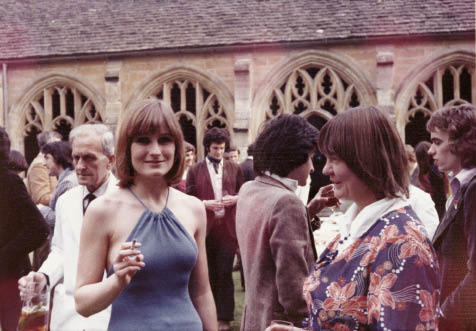Gully Wells is a spirited and amusing writer, the daughter of the American journalist Dee Wells and the stepdaughter of the famous philosopher Freddie Ayer. While an undergraduate at Oxford she had an affair with Martin Amis and travelled to Italy with him, a trip fictionalised in his recent novel, The Pregnant Widow (conveniently out in paperback at just the same moment as this memoir appears, for ease of cross-referencing). Wells worked for the publisher George Weidenfeld before marrying and moving to New York, where today she’s the features editor of a travel magazine. Christopher Hitchens and Anna Wintour are among her pals.
Her parents divorced when Gully was tiny. Not long afterwards, her ambitious and dogmatically unconventional mother laid siege to Freddie Ayer, who was much older, married and had a strong-willed long-term mistress, as well as various offspring, official and otherwise. None of which was enough to deter Dee Wells. She succeeded in getting Ayer to marry her, not once but twice: between marriages to Wells he fell deeply in love with, and married, the ravishing Vanessa Lawson, wife of Nigel.
Gully’s childhood and youth were spent in the middle of a rackety crowd: quantities of wine and lovers were consumed by the grown-ups, on both sides of the Atlantic, as well as in the family house in Provence. Brainy men retreated to their studies to think and write: their wives bossed about, cooking and driving and drinking and uttering sardonic bon-mots. A measure of the milieu is that there are three instances of people not being the biological children of the men they take to be their fathers, in the first 50 pages. Among them is Ayer’s then teenaged son, whom Gully Wells describes as ‘tall, dark and pointlessly good-looking’, who ‘bore no resemblance to his father’: unsurprisingly, since he was in fact the child of another philosopher, Stuart Hampshire.
How you respond to such observations will determine whether this highly entertaining memoir will raise your eyebrows or your spirits. You may wonder whether anyone is ‘pointlessly’ good-looking,and whether such an individual would be glad to see himself so described; and whether it is apposite for the private matter of his paternity to be rolled out for no nobler purpose than general amusement. You may, on the other hand, think it’s all rather thrilling and fast and droll.
Gully Wells is of course in the latter camp. ‘Clever and funny. Funny and clever’ were the guiding lights of her youth. ‘“Nice” people were dull, and the worst crime was to be a bore’. These were the tenets by which her mother lived; yet despite a tremendous number of parties and friends, Dee Wells seems never to have overcome her inner demons. She has terrible rages, and her jokes often tip into cruelty. Gully only hints at occasional clashes with her indomitable mother and seems to think herself very lucky to have been brought up by such a woman: generous, bright and ‘more fun than anybody else on earth’. But Dee Wells comes across as very much more abrasive and difficult than that. Gully reports that: ‘Freddie would retreat to his study . . . muttering, “That dreadful woman, that dreadful woman!” ’ He had a point.
Gully seems remarkably sunny and chipper, glossing over such potential family skeletons in the cupboard as the evident neglect of her half-brother by their mother. She very funnily admits to having ‘the taste, interests and obsessions of a fussy homosexual’, and describes herself as a mixture between a queeny gay man and a 1950s housewife. She enjoys cooking and setting a table. One senses that, within the pages of this cheerily amoral and bohemian book, a Mrs Beeton is struggling to remain concealed.
Intelligent, witty and frank, Wells admits that the thing she most wanted in life was to have babies. After some difficulty in conceiving, a daughter and some years later a son appeared. To celebrate, she painted her study walls ‘the most beautiful shade of Tiepolo blue’: the very colour of a positive result on a pregnancy testing kit. You couldn’t fail to like such a woman.
The people within this book are much more fun than the passages about the house in France, which read like the pages of an American travel magazine, hardly a shock, given Gully Wells’ day-job. It’s a nuisance that there is no index, although perhaps a wise omission by the publishers. The book might be more browsed than bought if it were easier to cherry-pick from its pages.






Comments